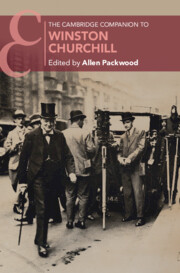Book contents
- The Cambridge Companion to Winston Churchill
- The Cambridge Companion to Winston Churchill
- Copyright page
- Contents
- Figures
- Contributors
- Foreword
- Acknowledgements
- Abbreviations
- Introduction
- 1 Churchill’s Contested History
- 2 The Inheritance of Winston Churchill
- 3 Learning Lessons
- 4 Churchill As a Writer and Orator
- 5 Churchill and Social Policy
- 6 Churchill, the ‘Irish Question’ and the Irish
- 7 Churchill’s First World War
- 8 Churchill, Art and Politics
- 9 Churchill’s Economics
- 10 Churchill, the Roosevelts and Empire
- 11 Churchill, India and Race
- 12 Churchill’s Campaign against Appeasement
- 13 Churchill As War Leader
- 14 Churchill, The English-Speaking Peoples and the ‘Special Relationship’
- 15 Churchill As International Statesman
- 16 Churchill and the Bombing Campaign
- 17 The Influence of Clementine Churchill
- 18 Churchill and the ‘United States of Europe’
- 19 Indian Summer or Conservative Winter?
- Conclusion
- Book part
- Index
- References
6 - Churchill, the ‘Irish Question’ and the Irish
Published online by Cambridge University Press: 19 January 2023
- The Cambridge Companion to Winston Churchill
- The Cambridge Companion to Winston Churchill
- Copyright page
- Contents
- Figures
- Contributors
- Foreword
- Acknowledgements
- Abbreviations
- Introduction
- 1 Churchill’s Contested History
- 2 The Inheritance of Winston Churchill
- 3 Learning Lessons
- 4 Churchill As a Writer and Orator
- 5 Churchill and Social Policy
- 6 Churchill, the ‘Irish Question’ and the Irish
- 7 Churchill’s First World War
- 8 Churchill, Art and Politics
- 9 Churchill’s Economics
- 10 Churchill, the Roosevelts and Empire
- 11 Churchill, India and Race
- 12 Churchill’s Campaign against Appeasement
- 13 Churchill As War Leader
- 14 Churchill, The English-Speaking Peoples and the ‘Special Relationship’
- 15 Churchill As International Statesman
- 16 Churchill and the Bombing Campaign
- 17 The Influence of Clementine Churchill
- 18 Churchill and the ‘United States of Europe’
- 19 Indian Summer or Conservative Winter?
- Conclusion
- Book part
- Index
- References
Summary
Churchill is often ranked as one of the most hated figures in Irish history but he was also one of the most influential politicians in shaping relations both within and between Britain and Ireland. Churchill played a formative role in the ‘Irish Question’. At the beginning of his career he was a Unionist, inheriting his father’s sympathy for Ulster, but converted to Home Rule. The chapter contrasts the impact of social reforms in helping Irish pensioners with the role of Irish suffragettes in defeating Churchill at Manchester in 1908. It looks at how he tried to navigate between the Unionists and nationalists in the Edwardian era, before showing how the war (including Irish losses at Gallipoli) led to rebellion. Thereafter, Churchill pursued a dual strategy of repression and negotiation and played a key role in the Anglo-Irish Treaty and the subsequent events surrounding partition. His belligerence has tended to overshadow the multi-faceted ways he dealt with and thought about the Irish.
Keywords
- Type
- Chapter
- Information
- The Cambridge Companion to Winston Churchill , pp. 112 - 136Publisher: Cambridge University PressPrint publication year: 2023



